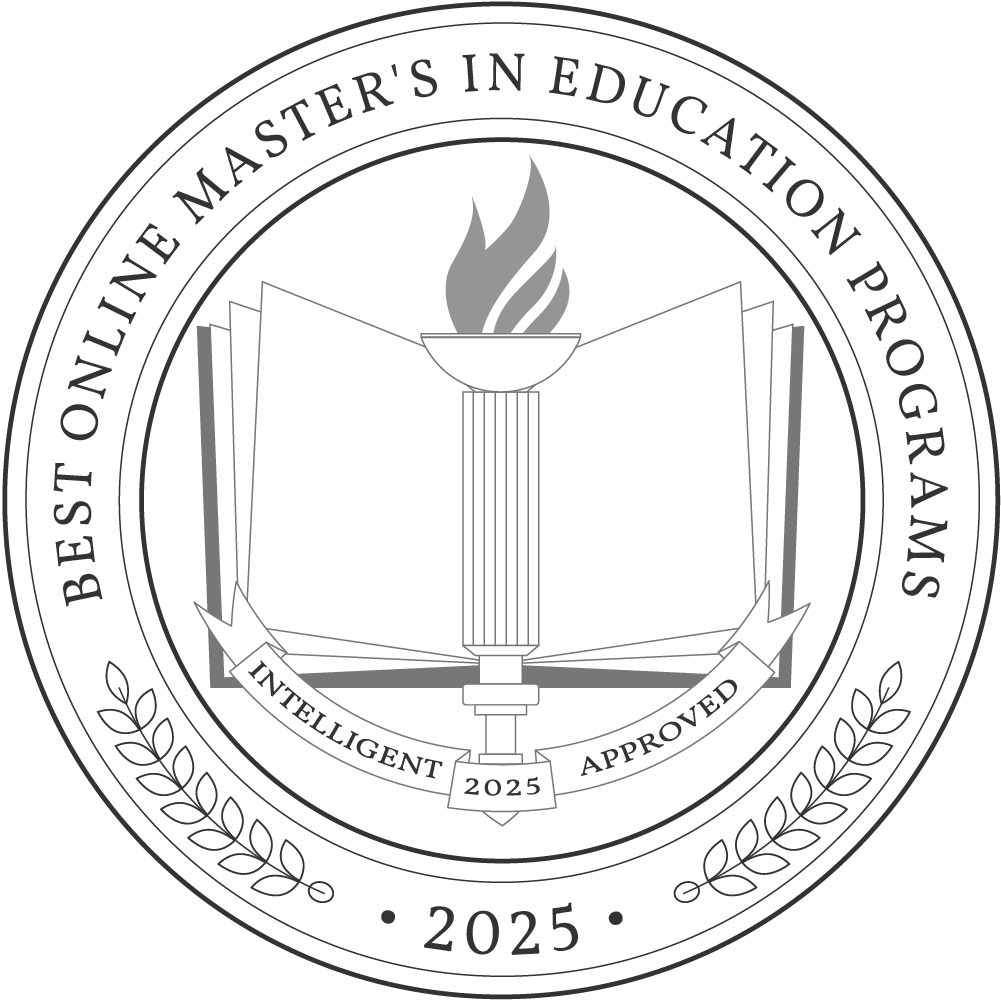Pursuing a master’s in education is a significant step towards advancing your career in education and making a lasting impact on students’ lives. It can open doors to new classroom teaching opportunities as well as leadership positions like school principal or instructional coordinator.According to the most recent data from the National Center for Education Statistics (NCES), elementary and secondary teachers who have a master’s degree earn an average base salary of $71.760, compared to $56,310 for those with a bachelor’s degree. The Bureau of Labor Statistics (BLS) predicts that there will be, on average, 867,600 new job openings in the education sector annually through 2032.With so many promising graduate degree programs available online, knowing which one is right for you can be difficult. That’s why Intelligent.com analyzed dozens of graduate degree programs to highlight the highest quality master’s in education programs currently available. This article also features guidance from Blanca Villagomez, a program counselor, and coordinator at UC-Irvine, regarding how to choose the right online master’s in education, what to expect from this degree program, and what career paths are available to individuals with a master’s in education.
What Can I Expect from an Online Master’s in Education Degree?
“Online programs generally offer a combination of asynchronous and synchronous modalities, so expectations and pacing can vary greatly across courses,” Villagomez says. “With asynchronous courses, interactions with professors and classmates can be limited and may require more effort to stay connected. Meanwhile, synchronous courses can facilitate engagement more easily, with professors requiring students to keep their video cameras on to encourage participation and interaction. Regardless of modality, all online degree programs require a high level of self-motivation, effective time management, and structured independent study.”
Earning your online master’s in education degree will further advance your knowledge and skills and ultimately prepare you for higher-level roles, such as school administrator, curriculum developer, and department head, among others.
These programs share commonalities with similar degree programs — including the Master of Arts in Education (MAE) and Master of Arts in Teaching (MAT) — but are unique for their broad range of educational topics and their design to help educators interested in various career paths succeed.
Obtaining an MAE may be a better fit for students interested in educational research, policy analysis, or advanced roles in academia. On the other hand, MAT programs are specifically designed for individuals with a bachelor’s degree in a subject other than education and who wish to become certified teachers.
While curriculums vary depending on the institution, most reputable master’s in education programs share a common goal — to prepare graduates to be more effective and knowledgeable practitioners, leaders, and advocates in educational settings. With this in mind, most programs focus on teaching advanced educational theories, instructional strategies, and curriculum development methods. There may also be specialization options, such as education leadership, educational technology, and curriculum and instruction.
The Top 50 Online Master's in Education Programs
Institution Type
Status
- Intelligent Score
- Alphabetically By University Name
- Acceptance Rate
- Enrollment
- In-state Graduate Tuition
- Out-of-state Graduate Tuition
- In-state Undergraduate Tuition
- Out-of-state Undergraduate Tuition

University of Iowa
Intelligent Score: 98.86In-state: $8,073
Out-of-state: $30,036
In-state: $10,079
Out-of-state: $10,079
SAT: 1110-1310
ACT: 22-29
$595
Online
Higher Learning Commission
36

California State University, East Bay
Intelligent Score: 98.72In-state: $5,742
Out-of-state: $17,622
In-state: $7,176
Out-of-state: $7,176
SAT: 870-1060
ACT: 15-20
$711
Online, On-Campus
WASC Senior College and University Commission
30

Clemson University
Intelligent Score: 98.59In-state: $14,118
Out-of-state: $37,110
In-state: $10,600
Out-of-state: $10,600
SAT: 1210-1390
ACT: 27-32
$515
Online
Council for Accreditation of Counseling and Related Educational Programs
33

University of Florida
Intelligent Score: 98.2In-state: $4,477
Out-of-state: $25,694
In-state: $10,770
Out-of-state: $10,770
SAT: 1290-1460
ACT: 29-33
$448
Online
Southern Association of Colleges and Schools Commission on Colleges
36-39

University of Virginia
Intelligent Score: 97.44In-state: $15,772
Out-of-state: $49,819
In-state: $17,076
Out-of-state: $17,076
SAT: 1320-1510
ACT: 30-34
$622
Online
Southern Association of Colleges and Schools Commission on Colleges
30

University at Albany
Intelligent Score: 97.2In-state: $32,236
Out-of-state: $52,926
In-state: $32,680
Out-of-state: $32,680
SAT: 1120-1320
ACT: 22-31
In-State: $532
Out-of-State: $626
Online
Middle States Commission on Higher Education.
36

San Diego State University
Intelligent Score: 96.95In-state: $5,742
Out-of-state: $17,622
In-state: $7,176
Out-of-state: $7,176
SAT: 1090-1300
ACT: 22-29
$566
Online
WASC Senior College and University Commission
35

University of North Texas
Intelligent Score: 96.41In-state: $8,295
Out-of-state: $18,111
In-state: $6,350
Out-of-state: $6,350
SAT: 1050-1240
ACT: 20-27
$450
Online
Texas Education Agency.
30

Michigan State University
Intelligent Score: 96.36In-state: $15,555
Out-of-state: $40,384
In-state: $18,858
Out-of-state: $18,858
SAT: 1100-1300
ACT: 23-29
$933
Online
Council for Accreditation of Counseling and Related Educational Programs
30

University of Illinois at Urbana - Champaign
Intelligent Score: 94.29In-state: $14,317
Out-of-state: $33,824
In-state: $15,016
Out-of-state: $15,016
SAT: 1200-1460
ACT: 27-33
$510
Online
Higher Learning Commission
32

Arizona State University
Intelligent Score: 93.75In-state: $10,710
Out-of-state: $28,800
In-state: $11,720
Out-of-state: $11,720
SAT: 1100-1320
ACT: 21-28
$565
Online
Higher Learning Commission
30

Auburn University
Intelligent Score: 93.67In-state: $10,080
Out-of-state: $30,240
In-state: $10,080
Out-of-state: $10,080
SAT: 1160-1320
ACT: 25-31
Resident: $612
Non-Resident: $1,836
Online, On-Campus
Southern Association of Colleges and Schools Commission on Colleges
30

Kansas State University
Intelligent Score: 92.4In-state: $9,375
Out-of-state: $25,251
In-state: $10,212
Out-of-state: $10,212
SAT: N/A
ACT: N/A
$536
Online
Higher Learning Commission
31

Texas A&M University TLAC
Intelligent Score: 91.86In-state: $8,395
Out-of-state: $36,849
In-state: $6,775
Out-of-state: $6,775
SAT: 1160-1380
ACT: 26-32
Resident: $891
Non-Resident: $2,009
Online
Southern Association of Colleges and Schools Commission on Colleges
36

UMass Lowell
Intelligent Score: 91.85In-state: $15,791
Out-of-state: $35,779
In-state: $14,014
Out-of-state: $14,014
SAT: 1200-1390
ACT: 27-32
$470
Online
New England Commission of Higher Education
30

Montclair State University
Intelligent Score: 90.18In-state: $12,082
Out-of-state: $20,042
In-state: $12,600
Out-of-state: $12,600
SAT: N/A
ACT: N/A
$690
Online
Middle States Commission on Higher Education.
36

Purdue University
Intelligent Score: 89.42In-state: $9,208
Out-of-state: $28,010
In-state: $9,208
Out-of-state: $9,208
SAT: 1170-1420
ACT: 25-33
In-State: $381
Out-of-State: $601
Online
Council for the Accreditation of Educator Preparation
30

University of Georgia
Intelligent Score: 89.37In-state: $9,790
Out-of-state: $28,830
In-state: $8,878
Out-of-state: $8,878
SAT: 1250-1460
ACT: 29-33
$629
Online
Southern Association of Colleges and Schools Commission on Colleges
36
How We Rank Schools
This list features some of the best online master’s degree programs in education in the U.S. All are offered at nonprofit, accredited institutions, either public or private, with a high standard of academic quality for post-secondary institutions.
We evaluated each degree program on tuition costs, admission, retention and graduation rates, faculty, reputation, and student resources. Then, we calculated the Intelligent Score on a scale of 0 to 100. Read more about our ranking methodology.
Next, we compared our picks to a list of aggregated college rankings from reputable publications like the U.S. News & World Report, among others, to simplify a student’s college search. We pored through these rankings so students don’t have to.
What Can I Do With an Online Master’s in Education?
Earning an online master’s in education can provide a pathway to becoming an educator or it can help prepare current teachers for advancement into leadership and administrative roles.
Depending on the specific program and an individual’s professional and educational background, a master’s in education may help them meet the necessary requirements for teaching certification. Each state in the United States has its requirements for teacher certification, including specific coursework, exams, and student teaching hours. Where you earn your degree can affect where you can get certified to teach. If you plan to teach in a specific state, it’s crucial to research that state’s certification requirements and ensure that the program you choose aligns with those requirements. Some programs may partner with multiple states to facilitate certification transfer, while others may focus on a specific state’s certification standards.
For those seeking a path beyond traditional educational settings, consider becoming a corporate trainer. Careers in this sector can yield six-figure salaries of $125,040, offering educators the chance to apply their expertise in corporate settings.
To keep up with the latest developments in the education industry, you should consider completing online courses related to your area of expertise in addition to your degree program.
Career outlook
- Elementary, middle, and high school teachers — Instruct students in a variety of subject areas in public, private, and charter school settings.
- Median annual salary: $64,393
- Projected employment growth (through 2032): 1%
- New jobs projected: 109,000 per year (elementary); 42,200 per year (middle), 67,100 per year (high school)
- Instructional coordinators — Oversee school curriculums and teaching standards, and develop instructional material, implement it, and assess its effectiveness.
- Median annual salary: $74,620
- Projected employment growth (through 2032): 2%
- New jobs projected: 19,200 per year
- School principals — Oversee all school operations, including coordinating curriculums, managing staff, and providing a safe and productive learning environment for students.
- Median annual salary: $103,460
- Projected employment growth (through 2032): 1%
- New jobs projected: 20,200 per year
Best States for Teaching Careers
Education career opportunities span all 50 states, although employment and annual salary vary widely.
According to the Bureau of Labor Statistics, Rhode Island has the nation’s highest-paid teachers, with an annual median salary of $119,840. Meanwhile, Indiana has the lowest median yearly salary, at $48,320.
The U.S. is currently experiencing a shortage of trained, qualified teachers, with some experts estimating as many as 55,000 open teaching positions in the country. The need is most acute in the South Atlantic and East South Central regions of the U.S.
| State | Annual median wage | Employment per 1,000 jobs |
| Alabama | $55,770 | 51.40 |
| Alaska | $75,360 | 62.77 |
| Arizona | $60,140 | 48.76 |
| Arkansas | $55,020 | 57.37 |
| California | $80,940 | 56.21 |
| Colorado | $61,640 | 52.31 |
| Connecticut | $78,610 | 75.69 |
| Delaware | $62,110 | 62.17 |
| District of Columbia | $86,380 | 45.16 |
| Florida | $57,350 | 43.51 |
| Georgia | $61,100 | 57.06 |
| Hawaii | $59,670 | 65.26 |
| Idaho | $54,600 | 56.29 |
| Illinois | $64,390 | 60.66 |
| Indiana | $57,740 | 50.61 |
| Iowa | $53,960 | 69.15 |
| Kansas | $51,820 | 62.60 |
| Kentucky | $56,440 | 51.17 |
| Louisiana | $56,650 | 57.24 |
| Maine | $59,560 | 64.91 |
| Maryland | $73,160 | 60.71 |
| Massachusetts | $80,050 | 67.05 |
| Michigan | $61,830 | 50.27 |
| Minnesota | $61,680 | 56.69 |
| Mississippi | $48,900 | 59.42 |
| Missouri | $58,570 | 56.89 |
| Montana | $56,950 | 57.55 |
| Nebraska | $62,320 | 57.19 |
| Nevada | $57,310 | 36.87 |
| New Hampshire | $62,500 | 60.78 |
| New Jersey | $71,820 | 67.83 |
| New Mexico | $63,170 | 60.86 |
| New York | $82,760 | 74.08 |
| North Carolina | $55,550 | 56.84 |
| North Dakota | $57,560 | 57.98 |
| Ohio | $65,840 | 58.40 |
| Oklahoma | $50,540 | 58.09 |
| Oregon | $72,820 | 54.46 |
| Pennsylvania | $68,610 | 58.92 |
| Rhode Island | $73,160 | 66.28 |
| South Carolina | $57,030 | 49.76 |
| South Dakota | $47,220 | 57.99 |
| Tennessee | $55,990 | 47.83 |
| Texas | $61,140 | 59.59 |
| Utah | $58,870 | 56.33 |
| Vermont | $63,650 | 89.62 |
| Virginia | $64,880 | 61.08 |
| Washington | $73,610 | 54.21 |
| West Virginia | $56,950 | 61.11 |
| Wisconsin | $60,260 | 55.17 |
| Wyoming | $54,050 | 72.17 |
**Source: Bureau of Labor Statistics, Occupational Employment and Wage Statistics
How to Choose the Online Master’s in Education Degree That’s Right for You
Step 1: Choose your area of study
“Thorough self-reflection is a great place to start the grad school research process, to ensure you’re selecting a graduate program that’s right for you,” Villagomez says. “Begin by reflecting on your strengths, such as areas of expertise, skills, and fields of knowledge. Make a list of all your career interests and outline the types of work that spark joy and excitement. Gaining clarity on your strengths and interests can help you find a graduate program and career track that are a good fit.”
Additionally, think about how you learn best, as this will ultimately determine which classroom environment and program structure you’ll thrive in. Determine whether you prefer synchronous or asynchronous learning and if you can commit to full- or part-time study. Remember that full-time study is more immersive and can help you complete the program quickly. Still, part-time study is an excellent option for working professionals or individuals with other significant responsibilities.
Step 2: Research schools and programs
“Students will need to develop a list of their parameters to help them narrow down their school options,” Villagomez says. “Some of the key information students should gather includes application requirements, cost of attendance and available financial aid, the institution’s reputation and ranking, available professional development resources, and the types of general support services offered by the school.”
Another critical piece of information is the school and program’s accreditation status. “Verifying the college’s accreditation ensures that the institution has the seal of approval by the U.S. Department of Education,” Villagomez says. Attending a non-accredited college or program can negatively impact future opportunities such as employment and doctorate study.”
Students entering an online master’s in education program should confirm that the institution has regional accreditation through a recognized accrediting body and programmatic accreditation through the Council for the Accreditation of Educator Preparation (CAEP).
Most of this information is available on a college’s website. Students can also learn more by contacting the school’s admissions office or participating in virtual or in-person open houses and information sessions.
Step 3: Prepare for applications and tests
You can prepare effectively for applications and standardized tests by thoroughly researching program requirements, application deadlines, and prerequisites, including:
- Reviewing transcripts
- Obtaining letters of recommendation
- Writing an engaging personal statement
- Creating or updating your resume or CV
When writing your personal statement, focus on outlining your educational goals and commitment to the field of education. You might consider detailing how earning your master’s in education will help you meet these goals, how this program’s values align with your own, and what you will contribute as a potential student.
For those requiring standardized test scores like the GRE, consider enrolling in a test prep course to maximize your potential. These test prep courses focus on improving verbal reasoning, quantitative reasoning, and analytical writing skills alongside teaching test-taking strategies that can help boost your scores when test day arrives.
Step 4: Select your program
If you apply to multiple programs, you may receive numerous acceptance letters. Take time to weigh your options by considering factors like program reputation, the curriculum’s alignment with your career goals, financial aid offers, and additional perks. Reach out to current students and alums for additional insights and firsthand perspectives. After all, no one knows these programs better than the students already enrolled or have been previously.
Make a decision that aligns with your long-term aspirations and personal preferences. Above all, remember that it’s not just about getting in; it’s about choosing the program that best fits your academic and career needs.
Step 5: Determine how you’ll pay for your degree
Obtaining higher education can be expensive, but it’s important to remember that many funding options are available to help you reduce your overall debt burden. Scholarships and grants, often based on academic merit or meeting specific criteria, can significantly offset tuition costs. While an option, student loans should be used cautiously due to their potential for increasing your debt burden over time.
If you need to take out student loans, submit the FAFSA, as it determines your eligibility for federal student loans, which generally have a lower interest rate and more flexible repayment terms than private loans. Consider programs such as Teacher Loan Forgiveness, which offers loan forgiveness for educators serving high-need schools. Public Service Loan Forgiveness is available for public service workers, including many education positions.
Frequently Asked Questions About Online Master’s in Education Degree Programs
Should I get a master's in education degree in person or online?
While both formats are excellent options, the answer to this question ultimately depends on your circumstances and learning preferences. Consider factors like your work schedule, location, and ability to commute. Online programs offer flexibility when scheduling courses and learning at your own pace, but they require significant self-discipline to complete. On the other hand, in-person programs provide networking opportunities and face-to-face interaction but may be more rigid — requiring specific class meeting times and completion deadlines.
You can select the best format for your goals and lifestyle by assessing your needs and weighing the pros and cons.
What are the admissions requirements for an online master's in education degree?
Admissions requirements for online master’s in education programs usually include the following:
- A bachelor’s degree from an accredited institution
- Minimum GPA (usually around 3.0, but some programs may have slightly higher or lower requirements)
- Transcripts from all previously attended institutions
- Letters of recommendation
- Statement of purpose or personal statement
- Resume or CV
- GRE scores (varies depending on the program)
Some programs may require a teaching certification and prefer applicants with relevant professional experience.
What is the average cost of an online master's in education degree?
The average cost of an online master’s in education degree can vary significantly. Tuition at public institutions is more affordable, with students paying an average of $12,596 for the 2021-22 academic year. Private education is usually more expensive, as illustrated by the $29,931 average tuition cost of the same year.
Although online programs can save students money by eliminating expenses for room and board or transportation to campus, Villagomez reminds students to budget for necessities for virtual learning, such as reliable internet service and hardware, as well as any special technical software that may be required for classes.
How long does it take to complete an online master's in education degree?
The duration for an online master’s in education degree varies depending on the program’s format and structure — but your enrollment status also plays a critical role. Your timeline might look like this, depending on your unique situation:
- Full-time programs: 1 to 2 years
- Part-time programs: 2 to 3 years or longer
- Accelerated programs: 12 to 18 months, with an intensive curriculum
It’s also important to consider that some programs offer self-paced options, which can extend or reduce your completion time depending on your circumstances.
How hard is an online master's in education degree?
The degree of difficulty of a master’s program varies based on a number of factors, including the program’s curriculum, a student’s own aptitudes, and how well students can balance their schoolwork with other work and life responsibilities.
Some online master’s in education programs are designed for students of all professional backgrounds, with curriculums that include foundational and advanced skills. Others are tailored to experienced teachers and may, therefore, dive right into higher-level skills and concepts. When researching programs, students should ensure that the curriculum matches their current level of education experience, and knowledge.
Students should also consider how much time and energy they have to devote to their online education. Attending a program full-time while working full-time and handling family and other life responsibilities may be more challenging than enrolling in a part-time or self-paced program that allows for more flexibility.
Is an online master's in education degree worth it?
In many situations, a master’s in education degree is worth it. This degree can help individuals achieve specific goals, such as pursuing careers in educational leadership or counseling, which often require an advanced degree. As part of maintaining teaching certification, educators must also participate in continuing education courses. In many cases, pursuing a master’s degree will fulfill continuing education requirements.
A graduate degree also raises earning potential. According to the NCES, during the 2020-21 academic year, elementary and secondary school teachers with a master’s degree earned an average annual salary of $71,760. Meanwhile, teachers who had only a bachelor’s degree earned an average annual salary of $56,310.
Related Resources
Compare School Options
Related Degrees
- Gifted and Talented Education
- Educational Administration
- Curriculum and Instruction
